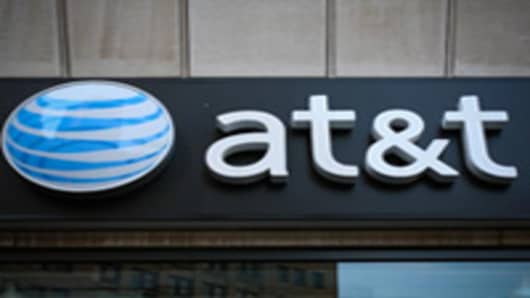Today AT&T announced a big changein how it's charging for data—dropping unlimited, flat-fee plans, in favor of tiered pricing.
This is a major shift, which should have rippled throughout telecom, and even into cable.
Today Bernstein Research senior analyst Craig Moffett issued a report saying he expects most other operators to follow, perhaps as early today.
AT&T's news is good for the majority of customers who will now pay less for their iPhone and iPad plans, and they should benefit from better service. While AT&T makes the entry point for its data plans less expensive, it's jacking up prices for heavy users. This indicates that AT&T firmly believes that data usage is only going to rise - it's giving up short-term revenue for the promise of cashing in on heavy data usage down the line.
AT&T is making this change because a small number of subscribers can slow its entire network - the company says 3 percent of subscribers account for 40 percent of data traffic. Charge people what they use, and AT&T will be able to directly monetize data usage, rather than letting some heavy users ruin speeds for everyone else without paying anything more.
The details: instead of its $30-per-month unlimited data plan, AT&T will charge new smart phone subscribers on a tiered basis. 200 megabytes of data - the equivalent of over 1,000 emails, 400 web pages and 20 minutes of streaming video will cost $15 a month. Ten times that much data, or 2 gigabytes, will cost $25 monthly. AT&T says that the vast majority - some 98% of AT&T customers use that amount or less. AT&T is also replacing its unlimited data option for the iPad, which cost $30 a month with this 2 gig, $25 monthly plan. If iPhone or iPad users with this plan use more than 2 gigs of data, AT&T will charge $10 a month for each additional gigabyte.
Today AT&T also introduced the option to use your iPhone as a modem for your laptop, called "tethering" for an additional $20 a month.
The telco is trying to avoid backlash - it will send text alerts to customers nearing the limits of their data usage, about to incur overage charges. And these new data plans are only mandatory for new iPad subscribers. If you already have an existing unlimited iPad plan, you won't be forced to drop it.
Moffett says that moving to usage-based pricing would put the whole industry on more stable footing. And Moffett expects pretty much the whole industry to adopt this model. The big question now, is how usage-based pricing affects usage. Won't people necessarily think twice about how they use their devices if they know they could end up paying more?
A shift to usage-based pricing could also inadvertently impact the cable business. Last year Time Warner Cable attempted to introduce the idea of a tiered pricing structure for broadband usage. Despite the fact that most users would probably have ended up paying less, subscriber outrage shut down the plan. It would make a lot more sense for the likes of Comcast and Time Warner Cable to charge heavy gamers, who clog up broadband pipes more than subscribers who use the Internet to surf newspaper websites. Perhaps AT&T's move to pay-per-usage pricing will get consumers used to the idea of tiered pricing at cable companies as well.
Questions? Comments? MediaMoney@cnbc.com



